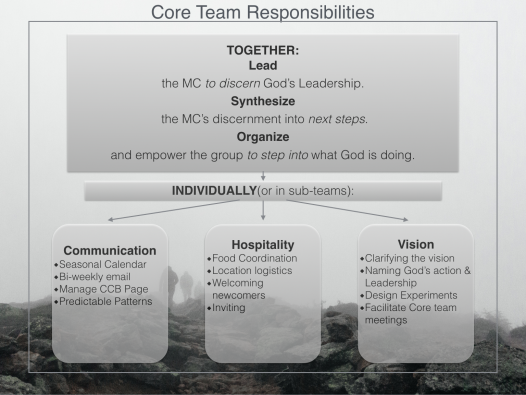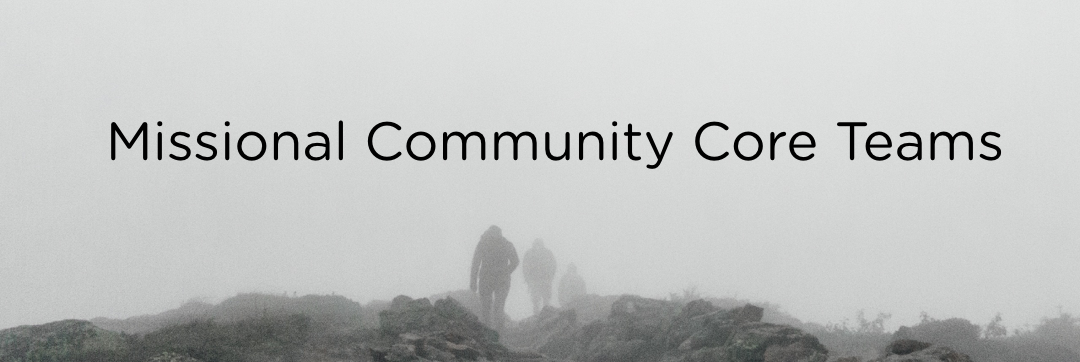What is a Core Team?
A Core Team leads Missional Communities by providing them with the structure, logistics, and spiritual leadership they need to respond to God’s leadership as a group.
What is the size of a Core Team? Each more team consists of three to six people, some have less (no less than two) and some have more. However, having a core team with more than eight people would become difficult.
How often do they meet? The Core Team typically meets once quarterly, and communicates (via email, phone, or text) monthly.
Here is a snapshot of what they are responsible for:

What is the Core Team responsible for together?
- Lead the Missional Community to discern God’s leadership.
- Synthesize the Missional Community’s discernment into next steps.
- Organize and empower the group to step into what God is doing.
(1) Leading the Missional Community to discern God’s leadership:
The journey of a Missional Community is one in which a group asks “what is God doing, and how can we join in (particularly in a specific neighborhood or network: a mission).” It follows that the Core Team of that Missional Community is tasked with the responsibility of empowering the group to continually ask those questions and shape their activity and life together around the answers.
How do they do that? The Core Team creates environments of discernment that produce actionable next steps for the group. The Core Team uses tools like Dwelling in the Word, Experiments, SWOT Analysis, Listening Interviews, Discerning Prayer, etc. to create environments where the group is listening to God, and searching for God’s leadership to know where to join in God’s activity.
Example: For the past few months, a neighborhood Missional Community has been focusing on doing BBQs in front lawns. It’s fall now and winter is fast approaching, so BBQs can’t be a “thing” until spring. The group is asking what’s next? At this point, the Core Team has to create environments for the group to listen to what else God might be doing in their neighborhood, and how he is inviting them into it over the winter. The Core Team may lead the group to Experiment and throw a house party (inside!) or ask the neighborhood what the biggest needs are in the winter through a Listening Interview. Then ask the group what they saw God doing from theses experiences. They will use this to shape what the next season of Missional Community might look like.
(2) Synthesizing Missional Community’s discernment into next steps.
Core Teams take the fruits of the Missional Community’s time of listening, and takes it a step further to produce concrete action steps and a plan. The Core Team acts as a funnel to focus the group’s discernment.
How do they do that? In their quarterly and monthly meetings and communication they decide what to do next based on the groups discernment. They ask “based on what we’ve heard from the group, what should we do next.” From this question, they produce plans that coincide with the group’s predictable patterns and monthly rhythms of UP, IN, OUT.
Example: Imagine if the above Missional Community came out of its experiments and listening interviews and discerned (among other things) that the neighborhood used to have a monthly pancake breakfast hosted by the neighborhood association, but there just hadn’t been resources or leadership in the past few years to pull it off. The Core Team might decide (based on the discernment of the group) that’s where the Missional Community should put their energy. They might decide God’s leading the group to resurrect the monthly pancake breakfast; thus, creating more community in their neighborhood.
(3) Organize and empower the group to step into what God is doing.
Next, the Core Team organizes the logistics, the resources, and communication necessary for the group to step into the things God is leading them toward.
How do they do this? Often through the work of sub-teams within the Core Team to provide the logistical planning, communication, and organization of resources necessary to accomplish what the group feels called to do. It’s important to note that just because the Core Team leads this aspect, that doesn’t mean they do everything themselves. The Core Team is functioning best when they involve the rest of the Missional Community in making things happen.
Example: After deciding to resurrect the neighborhood pancake breakfast, the Core Ceam divides up areas of responsibility to make it happen. A couple Core Team members manage the communication with the group and promotion in the neighborhood, a couple members manage all the food logistics, and a couple are responsible for building relationships with the neighborhood association to work with them on the project, etc.
What are the Core Team members responsible for individually?
When it comes to moving the Missional Community forward, the Core Team often chooses to break up into sub-groups to accomplish the logistics necessary to move the group towards participating with what God is doing. Typically, these sub-groups are responsible for three key areas: communication, hospitality, and vision.*
What are Core Team members who are focused on communication responsible for?
- Seasonal Calendars: a good goal for an MC is to shoot for producing a seasonal calendar so that people know what is happening when in the next season. See an example here.
- Bi-weekly email communication: It’s important to send reminder emails with logistical information about upcoming Missional community gatherings. See an example here.
- Manage CCB Group: Mill City uses Church Community Builder to help our groups communicate and organize.
- Ensuring Predictable Patterns: Predictable patterns make the group accessible for people who want to join in the mission, and it also gives those in the Missional Community the security and confidence they need to have the courage to dare together. The Core Team member who manages communication can act as someone who makes sure the team’s decisions and plans happen in a way that aligns with a rhythm of predictable patterns. Read a post about Predictable patterns.
What are Core Team members who are focused on hospitality responsible for?
- Food Coordination: Food is the nexus of Missional Community. Food is what brings people together, and mission often happens over a meal. Therefore, food is crucial to mission, and the logistics of coordinating the gathering meals are key. Many Missional Communities use the tool Perfect Potluck to organize food for their Missional Communities.
- Location logistics: Someone has to decide and coordinate the “where” and “when.” A mix of being in homes and in neighborhood (or network) spaces is important. What’s more important is that people know where and when the group is meeting.
- Welcoming newcomers: It’s great to have someone who sees their responsibility as equipping the Missional Community to be a welcoming environment for everyone. Someone who can invite a group member to ask a newcomer out to coffee, or simply ensure that everything the Missional Community does in their gathering is explained in a way that makes sense to people who don’t speak “christianese.”
- Inviting people to join the mission: The group needs someone who is always thinking about how to invite neighbors and more Mill City folk into the mission. These Core Team members often make themselves available at neighborhood events or times at Mill City where people are interested in learning more about Missional Communities.
What are the Core Team members who are focused on vision often responsible for?
- Clarifying vision: Notice I don’t say “coming up with the vision,” that’s not a role of any one person in the Missional Community, The role of the Core Team is to clarify the vision the group has discerned together. Clarity is important because it brings everyone together to move towards the direction they discerned. Practically, this means this person(s) could take the lead in the discerning processes by planning Listening Times, Experiments, etc.
- Naming and celebrating God’s activity in the group: It’s necessary to have people who are telling the story of what God has done, and is doing, to give people imagination for what God might be calling them to do next. These Core Team members are always bringing people back to the question “what is God doing, and how can we join in.”
- Design Experiments: These Core Team members often take the lead when the group is discerning what’s next, and one of the fundamental ways a Missional Community does that is through Experiments. Therefore, these Core Team members should be well versed in designing and leading these elements.
- Facilitate Core Team meetings: The nature of this responsibility cluster (vision) lends itself to the Core Team members who are focused on vision being the ones who facilitate the Core Team meetings. They are responsible for bringing the Core Team together, and creating meetings and monthly Core Team communications (email, text, video chat) that help the group fulfill their responsibilities (as a Core Team, and individually).
*The areas of vision, communication, and hospitality are not concrete roles or positions that have to be filled on a Core Team. There isn’t always a “vision person” or a “communication person,” rather, at any given point of the Missional Community’s journey, there are one or two people who take on that aspect of the Core Team’s responsibility. Thus, every Core Team is unique, and responsibility gets shared between Core Team members differently each time.
An Example Core Team:
Let’s keep running with our example from above with the Missional Community focused on a neighborhood. Let’s say there are six Core Team members: Jim, Johnica, Jess, Jeff, Jared, Jennifer (yes, all J names because why not 😉 #JDisbias). In this season, Jim and Johnica are focusing on vision, Jess and Jeff are focusing on hospitality, and Jared and Jennifer are focusing on communication. Now, lets return to the pancake breakfast, and follow the story of how the Core Team might operate individually.
What would Jim and Johnica do, or lead people to do? (Vision): They provide the resources necessary for the Listening Interviews in the neighborhood, design the Experiments to learn about the needs in the neighborhood, pick out scriptures for the group to dwell on, facilitate the Core Team meeting where they decide to do the pancake breakfast, and maybe even make the connection with the neighborhood association.
What would Jess and Jeff do, or lead people to do? (Hospitality): They most likely decide on and organize the logistics behind each gathering that lead up to the decision to do the pancake breakfast, they invite and orient newcomers to the purpose of the Missional Community, they are probably hard at work leading the logistics for the pancake breakfasts, and are helping the Missional Community become better at making the pancake breakfasts a more hospitable environment for their neighbors.
What would Jennifer and Jared do, or lead people to do? (Communication): They most likely create the new season calendar reflecting the pancake breakfast, and also produced the one before it when they were discerning that as their next step, send the bi-weekly emails to inform people of what is next, manage the CCB group communication, and develop a communication plan to let the neighborhood know about the pancake breakfast.
I hope this gives you a frame work for Core Teams of Missional Communities.
As you have questions, or comments, direct them to myself or Pastor Stephanie. We’re eager to discuss how this might work for your missional community.



Recent Comments